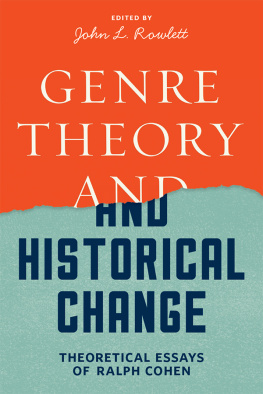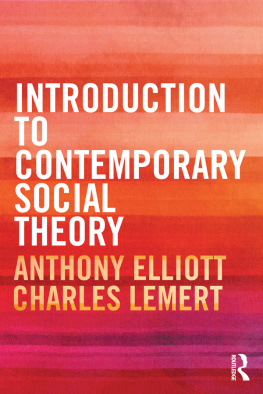
Routledge Revivals
The Concept of Social Change
Anthony Smiths important work on the concept of social change, first published in 1973, puts forward the paradigm of historical change as an alternative to the functionalist theory of evolutionary change. He shows that, in attempting to provide a theory of social change, functionalism reveals itself as a species of frozen evolutionism.
Functionalism, he argues, is unable to cope with the mechanisms of historical transitions or account for novelty and emergence; it confuses classification of variations with explanation of processes; and its endogenous view of change prevents it from coming to grips with the real events and transformations of the historical record. In his assessment of functionalism, Dr Smith traces its explanatory failures in its accounts of the developments of civilisation, modernisation and revolution. He concludes that the study of evolution is largely irrelevant to the investigation of social change. He proposes instead an exogenous paradigm of social change, which places the study of contingent historical events at its centre.
The Concept of Social Change
A critique of the functionalist theory of social change
Anthony D.Smith
First published in 1973
by Routledge & Kegan Paul Ltd
This edition first published in 2010 by Routledge
2 Park Square, Milton Park, Abingdon, Oxon, OX14 4RN
Simultaneously published in the USA and Canada
by Routledge
270 Madison Avenue, New York, NY 10016
Routledge is an imprint of the Taylor & Francis Group, an informa business
This edition published in the Taylor & Francis e-Library, 2010.
To purchase your own copy of this or any of Taylor & Francis or Routledges collection of thousands of eBooks please go to www.eBookstore.tandf.co.uk.
1973 Anthony D.Smith
All rights reserved. No part of this book may be reprinted or reproduced or utilised in any form or by any electronic, mechanical, or other means, now known or hereafter invented, including photocopying and recording, or in any information storage or retrieval system, without permission in writing from the publishers.
Publishers Note
The publisher has gone to great lengths to ensure the quality of this reprint but
points out that some imperfections in the original copies may be apparent.
Disclaimer
The publisher has made every effort to trace copyright holders and welcomes
correspondence from those they have been unable to contact.
ISBN 0-203-85167-6 Master e-book ISBN
ISBN 13:978-0-415-57920-9 (hbk)
ISBN 13:978-0-203-85167-8 (ebk)
ISBN 10:0-415-57920-1 (hbk)
ISBN 10:0-203-85167-6 (ebk)
The concept of social change
Monographs in Social Theory
Editor: Arthur Brittan, University of York
Titles in the Series
Zygmunt Bauman Culture as praxis
Keith Dixon Sociological theory
Antony D.Smith The concept of social change
A catalogue of the books in the other series of Social Science books published by Routledge and Kegan Paul will be found at the end of this volume.
The concept of social change
A critique of the functionalist theory of social change
Anthony D.Smith
First published in 1973
by Routledge & Kegan Paul Ltd
Broadway House, 6874 Carter Lane,
London EC4V 5EL and
9 Park Street,
Boston, Mass. 02108, U.S.A,
This edition published in the Taylor & Francis e-Library, 2010.
To purchase your own copy of this or any of Taylor & Francis or Routledges collection of thousands of eBooks please go to www.eBookstore.tandf.co.uk.
Anthony D.Smith 1973
No part of this book may be reproduccd in
any form without permission from the
publisher, except for the quotation of brief
passages in criticism
ISBN 0-203-85167-6 Master e-book ISBN
ISBN 0 7100 7607 x (c)
0 7100 7697 5 (p)
Library of Congress Catalog Number 7379114
Contents
Preface
My purpose in this book is to evaluate a recent attempt to achieve an overall sociological theory of social change. This is not, therefore, yet another general work on social change, but a study of one perspective on change. For this reason, I have made scant reference to other rival approaches like Marxism or conflict theory. My reasons for choosing the particular perspective known as neo-evolutionism are twofold: if America remains the most dynamic and influential centre of sociological activity, neo-evolutionism, or the functionalist theory of social change, represents the single most pervasive and dominant approach to change in America today. Secondly, neo-evolutionism expresses in modern terms and contemporary idiom a long tradition which lays emphasis upon the immanence of change in social life, a tradition by no means unchallenged, yet still vital. By analysing neo-evolutionism, I hope therefore to illuminate the nature and difficulties of this wider tradition, to which the functionalist theory of change is heir.
The emphasis throughout this work is on the validity and usefulness of the neo-evolutionary perspective for the understanding of problems of social change. Accordingly, I have tried to avoid the temptation to write a treatise on the sociology of knowledge, despite some suggestions about the backgrounds of recent functionalist concerns in the first chapter. Nor have I attempted to be comprehensive in my treatment. I have concentrated instead upon those theorists and works which seemed most paradigmatic for an understanding of the basic logic of neo-evolutionism. This explains why I have largely neglected all those political scientists who have adopted in one or other measure the neo-evolutionary framework, and have omitted all reference to the purely political ramifications of the outlook. From the standpoint of neo-evolutionism conceived as a theoretical framework, their task of application appears essentially derivative.
Nor am I concerned to offer an alternative theory of social change to that which I criticise, again despite some suggestions to that effect in the final chapter. I do not believe a meaningful theory of change in the sense of that term which has summed up a long-standing goal of sociology, to be either desirable or feasible. The dimensions and types of historical change are so various, that any overall theory must become too generalised to be relevant for the explanation of more specific changes. This is not, of course, to say that all general approaches are therefore equally valueless, On the contrary, I advance here some arguments on behalf of one such very general approach, insisting strongly upon the essentially historical, i.e. temporal, nature of social change, and on the role of patterns of events in initiating processes of change. At the same time, I regard such an approach as providing merely a methodological framework, no more; and certainly not as a general theory of social change.








